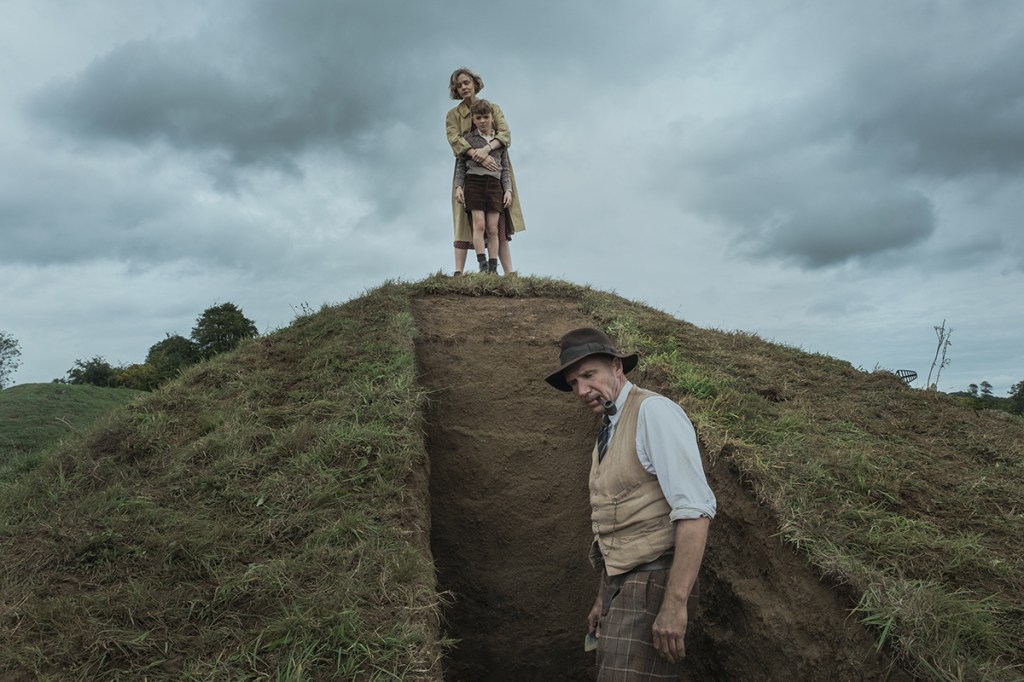Just before the outbreak of World War Two a discovery was made in a riverside field at Sutton Hoo in Suffolk. It was an immense buried boat, dating from the 7th century, and it yielded gilded treasure after gilded treasure, thereby wholly changing our understanding of the Dark Ages. ‘They weren’t dark… by Jupiter!’ as one archaeologist puts it here. It is a fascinating story that could have been told as a full-on thriller. But instead the film employs a delicious, graceful restraint, paying as much attention to deeply buried feeling as to what’s buried deeply in the earth. It’s remarkably moving. By Jupiter, I even cried by the end.
The film is directed by Simon Stone with a screenplay by Moira Buffini from the 2007 fact-based novel by John Preston. (True characters, true events, and lashings of poetic license.) The landowner at Sutton Hoo is Mrs Edith Pretty, played sublimely by Carey Mulligan. Edith is a wealthy widow who has always been intrigued by the ‘mounds’ on her land, and convinced that something lies beneath. She calls upon Basil Brown (Ralph Fiennes), a local man known for excavating, to start digging. Brown can’t call himself an archaeologist, as he left school at 12 and is self-taught. But he is so expert that he can smell the change in any soil. Fiennes, who deploys a heavy Suffolk accent, and wears a flat cap, may initially put you in mind of Paul Whitehouse in the Ted and Ralph sketches but you will quickly move on from that thankfully. Meanwhile, the experts at Ipswich Museum are sniffy about the project at Sutton Hoo as they’re excavating a Roman villa that’s ‘far bigger than your venture’. Yes, well, we’ll see about that.
Brown is reticent and taciturn and endlessly fiddles with his pipe while Edith is beautiful yet lonely, dressing for dinner yet dining alone, and also she is physically fragile, for reasons that eventually become clear. The two connect as Brown becomes a father figure to her young son, Robert (Archie Barnes), but their relationship, which could easily have taken a Lady Chatterley turn — ‘Mr Brown should leave Mrs Pretty’s mounds alone!’ a local even exclaims at one point — steers clear of that. The deal here is far more Brief Encounter. What’s buried stays buried, emotionally, which is what makes this so affecting. Plus there are other satisfying elements. The landscape is beautifully captured. The sense that everything dies and decays but may never be fully lost is beautifully captured. The discovery is exciting, even if we are only ever shown glimpses and not a single helmet or sumptuous item of silverware in full. And Ken Stott turns up (as a pompous archaeologist from the British Museum). As we all know, Ken Stott turning up can’t ever be a bad thing as he can never be boring. There is even some tension afoot: will the British Museum take over and steal all credit from Brown? Brown thinks this likely. ‘I won’t even be a footnote,’ he says, mournfully.
As for the less successful elements, the film takes a narrative swerve midway when it introduces Peggy Piggott, played by Lily James having had a make-under (mousy hair, big specs; heaven forbid they might cast a plainer actress). Based on Preston’s real-life aunt, she’s an archaeologist, newly married, who isn’t having much luck in the bedroom and is drawn to Edith’s fictitious cousin (Johnny Flynn), who is about to be called up to the RAF and is hot. This was hard to care about and you will constantly be saying to yourself: yes, yes, but how is Mrs Pretty doing today? Has Mr Brown shown Robert his telescope (not a euphemism)? That’s what’s at the heart of this and it’s what gives it such heart. You might even cry. No, by Jupiter, you will.
This article was originally published in The Spectator’s UK magazine. Subscribe to the US edition here.


















